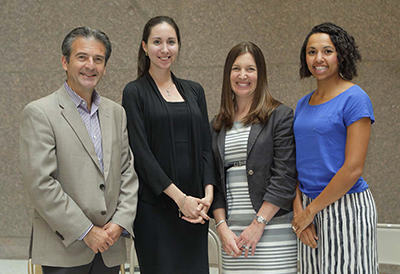Pediatric Endocrinology Inter-Institute Training Program
- Maya B. Lodish, MD, MHSc, Program Director, Pediatric Endocrine Fellowship, Staff Clinician, NICHD
- Constantine A. Stratakis, MD, D(med)Sci, Scientific Director, NICHD
- Jeffrey Baron, MD, Head, Section on Growth and Development, NICHD
- Rebecca Brown, MD, Senior Clinical Fellow, Clinical Endocrinology Branch, NIDDK
- Angela Delaney, MD, Assistant Clinical Investigator and Head, Unit on Genetics of Puberty and Reproduction, NICHD
- Rachel Gafni, MD, Craniofacial and Skeletal Diseases Branch, NIDCR
- Margaret Keil, MS, CRNP, Director, Pediatric Endocrine Clinical Services, NICHD
- Deborah Merke, MD, Chief of Pediatric Services Clinical Center, NIH
- Kristina Rother, MD, Head, Section on Pediatric Diabetes and Metabolism, NIDDK
- Jack Yanovski, MD, PhD, Head, Section on Growth and Obesity, NICHD
- James Mills, MD, Senior Investigator, Division of Epidemiology, Statistics, and Prevention Research, NICHD
- Stephanie Chung, MD, Assistant Clinical Investigator, NIDDK
- Youn Hee Jee, MD, Senior Fellow, NICHD
- Fetima Worthington, Program Coordinator, NICHD
The Fellowship in Pediatric Endocrinology is a three-year, ACGME–accredited program. Applicants must have completed a residency in Pediatrics or Medicine/Pediatrics and be eligible to sit for the American Board of Pediatrics certification examination. Three fellows are accepted per year. The fellowship is based at the National Institutes of Health Clinical Center, which is one of the largest and most sophisticated research institutions in the United States. The program is conducted in partnership with Children’s National Health System in Washington, DC. The fellowship is designed to provide clinical and research exposure that permits the development of academic Pediatric Endocrinologists with experience in both clinical and bench research.

Click image to enlarge.
Fellows and faculty
From left to right, Constantine Stratakis (faculty), Cemre Robinson (fellow), Maya Lodish (faculty), and Miranda Broadney (fellow)
Program structure
The Pediatric Endocrinology Fellowship at NIH consists of one year of clinical training and two years of combined clinical and research training.
First year
A typical training schedule for first-year fellows includes six months at the NIH clinical research center, four months at Children’s National Health Systems (CNHS), one month at The Johns Hopkins University Hospital, Baltimore, MD, and one month at Georgetown University Hospital, Washington, DC. Continuity clinics are held once a week and alternate between the NIH outpatient pediatric endocrine clinic and the diabetes and general endocrine outpatient clinics at CNHS. In addition, multi-disciplinary clinics in long-term follow-up for childhood cancer survivors, bone health, polycystic ovarian syndrome, disorders of sexual development, obesity, thyroid nodules, and cancer are offered. The Clinical Center maintains clinical research protocols involving the treatment of adrenal and pituitary tumors, congenital adrenal hyperplasia, McCune-Albright syndrome, disorders of sexual development, obesity, Cushing's syndrome, and others.
Second and third years
During the second and third years, mandatory clinical responsibilities are limited to a half-day continuity clinic per week and inpatient pediatric endocrine consultation on an on-call basis for three months per year. Fellows learn how to develop a research protocol, conduct a study, evaluate the results, and create a presentation or manuscript suitable for publication. Fellows may choose to work in a laboratory setting, clinical setting, or both, and they perform state-of-the-art basic and clinical research closely supervised by internationally known mentors. During the first year, a research mentor is chosen and the fellow’s progress is monitored by a Scholarship Oversight Committee. The overwhelming majority of our fellows go on to present their work at national and international meetings and choose academic careers following graduation.
Additional information
The following URL provides more detailed information about the program: http://pe.nichd.nih.gov.
Application information
Applications are submitted through ERAS. The application must contain three letters of reference, medical school transcripts, USMLE scores, a personal statement, and a CV. The program participates in the NRMP match; pediatric endocrinology is now part of the fall subspecialty match. Applications must be submitted by August 31st, and interviews are conducted from September through November. Applicants must register with both NRMP and ERAS (http://www.nrmp.org, https://www.aamc.org).
Collaborators
- Andrew Bremer, MD, PhD, Division of Diabetes, Endocrinology, and Metabolic Diseases, NIDDK, Bethesda, MD
- Priya Vaidyanathan, MD, Children's National Health System, Washington, DC
Contact
Maya Lodish, MD, MHSc, Program Director
Ms. Fetima Worthington, Program Coordinator
fetima.benjamin@nih.gov
Pediatric Endocrinology Training Program
NICHD, NIH
Building 10, Room 9D42
10 Center Drive
Bethesda, MD 20892-1830


